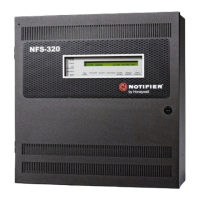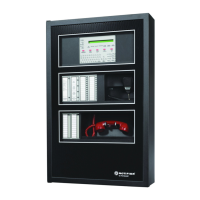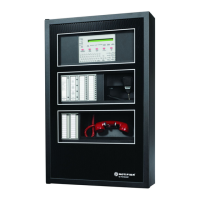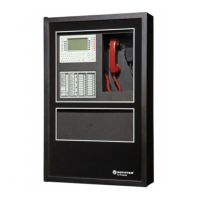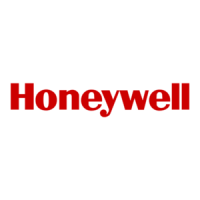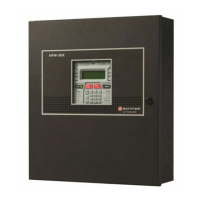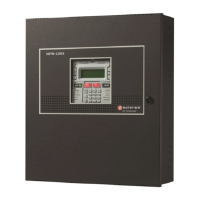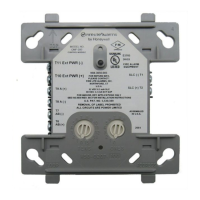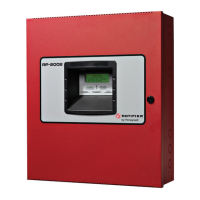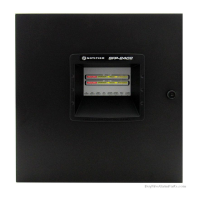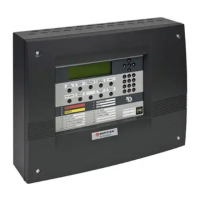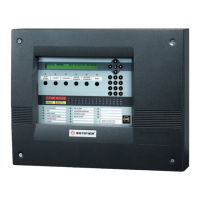NFS-320/E/C Operations Manual —NFS-320/E/C Operations Manual —
Installation PrecautionsInstallation Precautions
Adherence to the following will aid in problem-free installation with long-term reliability:Adherence to the following will aid in problem-free installation with long-term reliability:
WARNING - Several different sources of power can beWARNING - Several different sources of power can be
connected to the fire alarm control panel.connected to the fire alarm control panel.
Disconnect allDisconnect all
sources of power before sources of power before
Control unit and associ-Control unit and associ-
ated equipment may be damaged by removing and/or insert-ated equipment may be damaged by removing and/or insert-
ing cards, modules, or interconnecting cables while the unit ising cards, modules, or interconnecting cables while the unit is
Do not attempt to instaDo not attempt to insta
ll, service, or operate thisll, service, or operate this
unit until manuals are read and understood.unit until manuals are read and understood.
System Re-acceptance Test after SoftwareSystem Re-acceptance Test after Software
o ensure proper system operation, o ensure proper system operation,
must be tested in must be tested in
accordance with NFPA 72 after any pro-accordance with NFPA 72 after any pro-
gramming operation or gramming operation or
change in site-specific software. change in site-specific software.
acceptance testing is required after any change, addition oracceptance testing is required after any change, addition or
deletion of system components, or after any modification,deletion of system components, or after any modification,
repair or adjustment to system hardware or wiring. All compo-repair or adjustment to system hardware or wiring. All compo-
nents, circuits, system operations, or software functions knownnents, circuits, system operations, or software functions known
to be affected by to be affected by
a change must be a change must be
100% tested. 100% tested.
to ensure that other operations are not inadvertently affected,to ensure that other operations are not inadvertently affected,
at least 10% of initiating devices that are not directly affectedat least 10% of initiating devices that are not directly affected
by the change, up to a maximum of 50 devices, must also beby the change, up to a maximum of 50 devices, must also be
tested and proper system operation verified.tested and proper system operation verified.
meets NFPA requirements for operation at 0-49ºmeets NFPA requirements for operation at 0-49º
condensing) at 3condensing) at 3
(90°F ± 3°F). (90°F ± 3°F).
life of the system's standby batteries and the electronic com-life of the system's standby batteries and the electronic com-
ponents may be adversely affected by extreme temperatureponents may be adversely affected by extreme temperature
ranges and humidityranges and humidity
Therefore, it is recommended Therefore, it is recommended
system and its peripherals be installed in an environment withsystem and its peripherals be installed in an environment with
a normal room temperature of a normal room temperature of
15-27º C/60-80º F.15-27º C/60-80º F.
Verify that wire sizes are adequateVerify that wire sizes are adequate
for all initiating and indi-for all initiating and indi-
cating device loops. cating device loops.
Most devices cannot tolerate more than Most devices cannot tolerate more than
10% I.R. drop from the specified device voltage.10% I.R. drop from the specified device voltage.
Like all solid state electronic devices,Like all solid state electronic devices,
this system maythis system may
operate erratically or can be damaged when subjected to light-operate erratically or can be damaged when subjected to light-
ning induced transients. ning induced transients.
Although no system is Although no system is
immune from lightning transients and interference, properimmune from lightning transients and interference, proper
grounding will reduce susceptibility. Overhead or outside aerialgrounding will reduce susceptibility. Overhead or outside aerial
wiring is not recommended, due to an increased susceptibilitywiring is not recommended, due to an increased susceptibility
to nearby lightning strikes. to nearby lightning strikes.
Consult with the TConsult with the T
echnical Ser-echnical Ser-
vices Department if any problems are anticipated or encoun-vices Department if any problems are anticipated or encoun-
Disconnect AC power and batteriesDisconnect AC power and batteries
prior to removing orprior to removing or
inserting circuit boards. inserting circuit boards.
Failure to do Failure to do
so can damage circuits.so can damage circuits.
Remove all electronic assembliesRemove all electronic assemblies
prior to any drilling, filing,prior to any drilling, filing,
reaming, or punching of the enclosure. When possible, makereaming, or punching of the enclosure. When possible, make
all cable entries from the sides or rearall cable entries from the sides or rear
Before making modifi-Before making modifi-
cations, verify that they will not interfere with battery, trans-cations, verify that they will not interfere with battery, trans-
former, or printed circuit board location.former, or printed circuit board location.
Do not tighten screw terminalsDo not tighten screw terminals
tightening may damage threads, resulting in reduced terminaltightening may damage threads, resulting in reduced terminal
contact pressure and difficulty with screw terminal removal.contact pressure and difficulty with screw terminal removal.
This system contains static-sensitive components.This system contains static-sensitive components.
Always ground yourself with a proper wrist strap before han-Always ground yourself with a proper wrist strap before han-
dling any circuits so that static charges are removed from thedling any circuits so that static charges are removed from the
Use static suppressive packaginUse static suppressive packagin
g to protect electronicg to protect electronic
assemblies removed from the unit.assemblies removed from the unit.
Follow the instructionsFollow the instructions
in the installation, operating, and pro-in the installation, operating, and pro-
gramming manuals. These instructions must be followed togramming manuals. These instructions must be followed to
avoid damage to the control panel and associated equipment.avoid damage to the control panel and associated equipment.
FACP operation and reliability depend upon proper installation.FACP operation and reliability depend upon proper installation.
Precau-D1-9-2005Precau-D1-9-2005
This equipment generates, uses, and canThis equipment generates, uses, and can
radiate radio frequency energy and if not installed andradiate radio frequency energy and if not installed and
used in accordance with the instruction manual mayused in accordance with the instruction manual may
cause interference to radio communications. It has beencause interference to radio communications. It has been
tested and found to comply with the limits for class Atested and found to comply with the limits for class A
computing devices pursuant to Subpart B of Part 15 ofcomputing devices pursuant to Subpart B of Part 15 of
FCC Rules, which is designed to provide reasonableFCC Rules, which is designed to provide reasonable
protection against such interference when devices areprotection against such interference when devices are
operated in a commercial environment. Operation of thisoperated in a commercial environment. Operation of this
equipment in a residential area is likely to cause interfer-equipment in a residential area is likely to cause interfer-
ence, in which case the user will be required to correctence, in which case the user will be required to correct
the interference at his or her own expense.the interference at his or her own expense.
Canadian RequirementsCanadian Requirements
This digital apparatus does not exceed the Class This digital apparatus does not exceed the Class
for radiation noise emissions from digital apparatus setfor radiation noise emissions from digital apparatus set
out in the Radio Interference Regulations of the Cana-out in the Radio Interference Regulations of the Cana-
dian Department of Communications.dian Department of Communications.
Le present appareil numerique n'emet pas de bruits Le present appareil numerique n'emet pas de bruits
oelectriques depassant les limites applicables aux oelectriques depassant les limites applicables aux
reils numeriques de la classe A prescrites dans lereils numeriques de la classe A prescrites dans le
Reglement sur le brouillage radioelectrique edicte par leReglement sur le brouillage radioelectrique edicte par le
ministere des Communications du Canada.ministere des Communications du Canada.
Acclimate Plus™Acclimate Plus™
Notifier Integrated Systems™Notifier Integrated Systems™
NOTI•FIRE•NET™NOTI•FIRE•NET™
are all trademarks; andare all trademarks; and
are all registered trademarks of Honeywell International Inc.are all registered trademarks of Honeywell International Inc.
is a registered trademark andis a registered trademark and
is a trademark of Echelon Corporation.is a trademark of Echelon Corporation.
is a registered trademark of Datapoint Corporation.is a registered trademark of Datapoint Corporation.
registered trademarks of the Microsoft Corporation.registered trademarks of the Microsoft Corporation.
is a registered trademark of is a registered trademark of
GE Plastics, a subsidiary of General Electric Company.GE Plastics, a subsidiary of General Electric Company.
©2006 by Honeywell International Inc. All ©2006 by Honeywell International Inc. All
rights reserved. Unauthorized use of this document is strictly rights reserved. Unauthorized use of this document is strictly
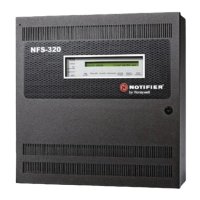
